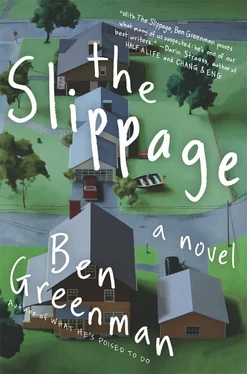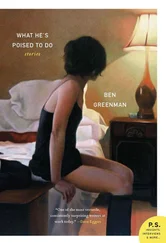“If we’re going to have a chauffeur, we should at least have that glass that goes up between us,” Louisa had said, but by the next morning’s breakfast, she too had settled into easy obedience. All that was left of her disapproval was her nickname for the couple: Eight Eyes, because they both wore glasses, and both made a big show of misplacing them and then saying they’d be lost without them. The second night, the four of them played a board game that no one understood very well. Marilyn insisted that each player had to roll the dice, move around the board, and then draw two cards and act them both out simultaneously. Mike said that was impossible. “What if you drew left and right?” he said. “Or up and down? How would you act those out at the same time?” His voice was rising to a pitch that suggested he was going to lord it over her.
William said he thought he knew and then stood still in the middle of the room. “See,” he said, “both up and down, both left and right. Easy.”
Marilyn laughed warmly and this softened Mike, who refilled everyone’s wineglass and then told a series of long, sentimental stories about his family, which included two sisters and an older brother who had died in a car accident in college. “We have an agreement that if we have a boy, he’ll be named after Jerry,” he said, his voice catching, and Marilyn, sitting on the floor next to his chair, reached up and squeezed his hand.
The third day, the last day, Louisa woke William up early. She was wearing what looked like a tennis outfit, a short white skirt and a tight yellow top. He squinted against its brightness. “Come with me,” she said. “The rest are sleeping.”
She led him out behind the house, where a path ran the length of a long low wall. At the end of the wall, almost like a mark of punctuation, there was a giant oak tree with a tire swing tied to a thick low branch. She climbed into the tire and he pushed her around for a while. The cold morning sharpened them. “Can’t you just imagine living in a place like this?” she said. “Me and you and the twelve kids.”
“Twelve?” William said. He made a sputtering noise.
Louisa laughed, and even when she stopped the laughter stayed on her face. “Okay, six,” she said. “It’s settled. I’ll be the hausfrau. You can go to work at the newspaper and come home early, or late but with tales of heroism. It’ll probably be three boys and three girls, and they’ll line up on either side of you and listen with saucer eyes.”
She hopped down from the swing and put her arms around the trunk of the tree like she was embracing it. Then she reached behind her and lifted her skirt. “Hey,” she said. “Why don’t you come over here and fuck me before Eight Eyes wakes up?”
William had rarely heard her use the word except in anger. It excited him, and he did his best to bring it off despite the cold. Louisa kept herself steadied against the tree the whole time, grunting lightly into the bark. Then she turned and kissed him. “I forgot to brush my teeth,” she said. “I hope that’s okay.”
The sun was beginning to burn off the morning mist and she asked William to push her in the swing for a few minutes more. He sent her off with a little thrill, knowing she’d be right back. When they returned to the house, she balanced on the low wall, arms out like she was flying.
Monday night, they drove home. Mike apologized for getting them back so late. “It’s going to be hard to spring out of bed for work,” he said. “But this way, no rush hour.” He pulled up in front of William’s house and popped the trunk so that William could get his suitcase.
“You’ve got a good one there,” Mike said.
His tone was too fatherly by half and William clowned him off. “The suitcase?” he said.
“No,” Mike said. “Louisa. Marilyn thinks very highly of her and I can see why. She’s pretty and sane.”
“Pretty insane?” William said, because that’s what he had heard. But then he looked at Mike and saw genuine affront in his expression and he was sorry that he was taking it all lightly, their generosity and Marilyn’s cooking and the way the drive home was latticed with good feeling. “You’re right,” William said warmly. “She’s a keeper. I won’t screw it up. I promise.”
He reached out and shook Mike’s hand and they went their separate ways, Mike and Marilyn to suburban Pittsburgh, where they married, raised a family of three boys, separated over money trouble, got back together when Marilyn was diagnosed with cancer, and celebrated their twentieth anniversary the week before their oldest son’s high school graduation. Louisa never mentioned that house again, said she didn’t remember it very well when William brought it up, and William learned, slowly, a lesson, which was not to take seriously any desire that did not recur. People were filled with whims, with wants that fit perfectly into a moment, but only that moment, and that had no broader application. And so they never had gone out to the country for that low wall or any other, instead staying in town, more or less rooted to the spot, moving always both up and down, both left and right.
Part VI. SOMEONE ELSE’S MIRACLE
In the wake of their visit to the cemetery, Louisa had become suddenly ardent, and William had receded. Then, after he agreed to move forward with the house, he settled back and waited for another wave of good feeling, only to find that for her, his decision was the conclusion of a struggle, one where she had emerged triumphant, and to the victor went the spoils, which in this case included the right to be quiet again, careful and inward, refusing to reveal too much by word or gesture. When he tried to reach her she did not pull back, exactly, but stayed right where she was, giving up nothing, not even interest.
He tried to rouse her with planning. He spread an oversize sheet of graph paper on the kitchen table. “Come,” he said, and she did, silently, and he took a pencil and drew Harrow, running east to west, and a large rectangle for the lot. “Circular driveway?” he said, and Louisa made no objection, and there it was, a rainbow rising off the horizon of the street. He made a line to indicate the front wall and a notch for the doorway. The rest of the page was only empty space and he felt claustrophobic and agoraphobic all at once. “That’s just the beginning,” he said. Louisa’s eyes shone unhelpfully.
He drew again the next night, and then a few nights later, neither time with any great success, though Louisa did start to pitch in with minor suggestions. She wanted a flower bed out in front, and an asymmetrical fence. The fourth time they drew, there was a ring at the door: Tom, coming to return Louisa’s extra pair of car keys. “This is the old homestead I’ve heard so much about?” he said. He smelled beery.
“It’s the new homestead,” Louisa said. “And you’ve heard nothing about it.” She went into the kitchen to watch the high-tech cylinder make coffee. William wondered if she’d noticed the beer, too, or if she was taking the edge off her own wine.
“It looks kind of traditional. Is that a white picket fence, or off-white?”
“It doesn’t need to be untraditional. It’s not one of your charts,” William said.
“Charts are for water,” Tom said. “Maps are for land.”
“You know what I mean. It’s not an artwork. It’s where we’re going to live.”
“I just think you could do something more interesting,” Tom said. “How about radical verticality?”
“What do you mean?”
“Stories and stories. A tower.”
“The neighbors would love that,” William said.
“Who cares what they say? There’s no kids, so stairs aren’t your enemy. Go up, young man.”
Читать дальше












